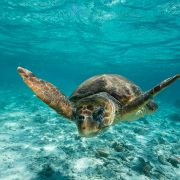Grand Residences has welcomed its first sea turtle of 2018. On May 10, a loggerhead turtle came ashore on the beach just to the south of Grand Residences. The resort security team watched over her as she laid 98 eggs. All along the Mexican Caribbean coast turtles are now beginning to nest and we hope that this loggerhead will be the first of many to emerge from the waves on our stretch of beach.
Our beach staff and security guards stack beach sun beds and chairs before the sun goes down and remove any garbage and seaweed that may have washed ashore. Removing potential obstacles will make it easier for the turtles to drag their huge bulk up the beach and dig their nests in the sand.
How can you help sea turtles?
• Alert the security staff if you spot a sea turtle coming ashore
• Be very quiet and keep still
• Watch from a distance of ten meters
• Do not attempt to touch the turtle or crowd her
• Do not shine a torch or use the light on your mobile phone
• Please, no flash photography
• No smoking
• Follow the instructions given by security staff at all times
• Help us to keep our beaches and sea clean
• When snorkeling or diving watch turtles from a distance, do not swim towards them and do not attempt to touch them
• Wear a t-shirt when snorkeling as protection from the sun instead of applying sun block. Sun products pollute the water and are harmful to marine life
• Turtles are protected by Mexican law and it is illegal to disturb, persecute and hunt them and consume their meat or eggs.
Mexican environmental agency regulations keep human contact with the turtle hatchlings to a minimum and the participation of hotel guests in turtle releases is no longer permitted.
Helping sea turtles by reducing our reliance on plastic
Hundreds of thousands of marine creatures, including sea turtles, dolphins and sea birds, perish every year around the world as a result of injuries sustained from discarded fishing nets, packaging, bags and other plastic waste floating in our oceans. They become trapped or ingest plastics that they mistake for food. Plastic objects and tiny particles called micro plastics also build up in the bodies of fish and birds and are passed on up through the food chain.
From huge floating garbage islands to plastic found in the remotest parts of our oceans and in the depths, plastic is everywhere. The problem is growing and scientists estimate that by 2050, there will be more plastic in the sea than fish.
We can all take steps towards a cleaner world. Whether it is recycling to switching to cloth shopping bags or reusable water bottles and asking the waiter not to bring your drink with a plastic straw every little helps.





Leave a Reply
Want to join the discussion?Feel free to contribute!